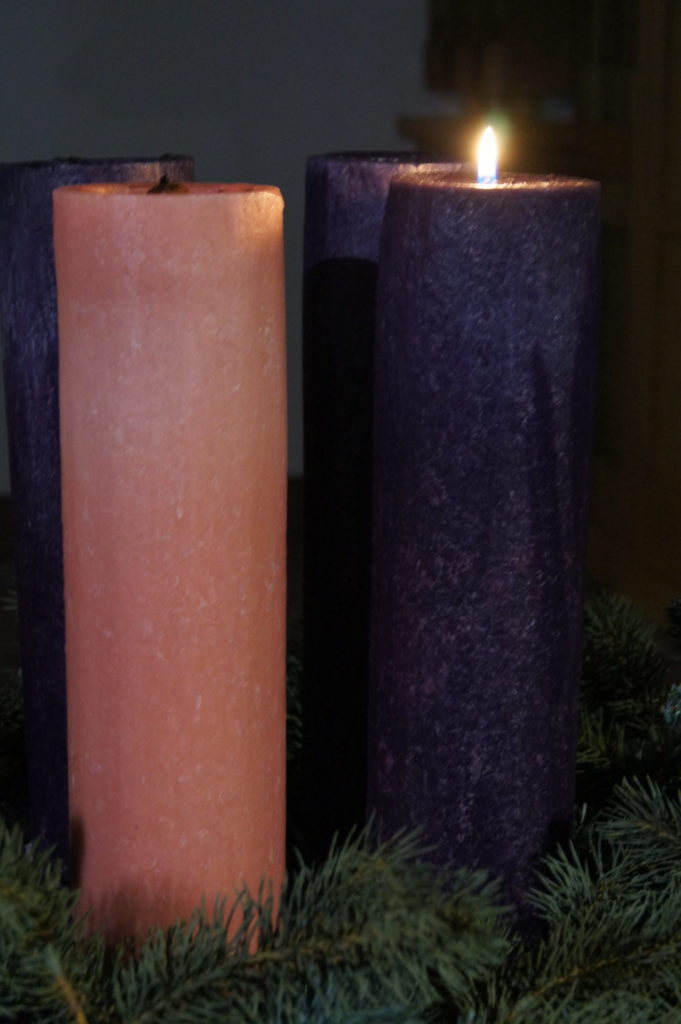 We have come to the end of Ordinary Time – that sequential numbering that reminds us that our days, once lived, are gone forever. Today we begin a new liturgical year. To what is God calling us?
We have come to the end of Ordinary Time – that sequential numbering that reminds us that our days, once lived, are gone forever. Today we begin a new liturgical year. To what is God calling us?
Sister Barbara shared a story one morning on Benet Hall. She was teaching first grade in Phoenix and had 45 little children in her class. One morning her alarm went off, and she lay there and said, “Lord, I can’t do it today. I just want to stay in bed.” But she rolled over, sat up, and planted both feet on the floor. There between them lay a bookmark that had fallen out of her Bible the night before. She read, “Arise, my darling, my beautiful one, and come with me.”
What a wonderful invitation! “Arise, my beloved, and come.” We hear it repeated, in different words and circumstances, throughout this Sunday’s readings, words of encouragement and hope and the call to wake up and live.
In the first reading, Isaiah sees a future when all peoples have embraced God’s call to peace and justice. They have turned their weapons into plows and pruning hooks, and they walk in the light of the Lord. But we know that becoming a peacemaker requires that we first radically adjust our priorities. We have to stop holding onto things that promise what they cannot give: money that promises to give life meaning, weapons that pretend they can guarantee security, ways of worship that whisper that we can control God.
In the second reading Paul tells the Church in Rome, “Wake up! Our salvation is coming, our long night is drawing to a close. Look! the light is shining in the east. Stop following your own petty desires. Don’t crawl out of bed and put on yesterday’s dirty clothing. Don’t clothe yourself in fear and gloom and bitterness. Turn toward the light and let God clothe you with the spirit of Christ.”
And finally, in Matthew’s Gospel, Jesus warns us not to be complacent. He compares his present time to the story of Noah, where people were living according to their own desires, as though nothing would ever change. Then Noah entered the ark and the flood poured down, and it was too late to turn their lives around. That is what happens when we die. We suddenly run out of time, and we see what we once thought important in the unflinching light of eternity.
What can we learn from all this? In his Holy Rule, Benedict asks us to be mindful of the reality of death. God doesn’t want us to fear death itself, but to fear dying without having been fully alive. God doesn’t want some false human perfection. Human perfection is all about control. Spiritual perfection is about surrender. It asks that we live simply, intentionally, and mindfully, that we take notice, that we be grateful, that we love passionately. Thomas Merton said that “your life is shaped by the end you live for. You are made in the image of what you desire.” Desire God above all else. Choose to love.
None of us will have enough days to learn to love as we should. Our days are numbered and fall behind us one by one. How can we live out our days so that, when the end comes, we are ready?
We can arise each morning, knowing we are loved. We hear God calling our name. We greet our Beloved. We find God in the ordinary encounter of the moment. We see Christ’s face in every person we meet. We live the day as if it is the last, as if we have been given only this day. We savor the sweet brevity of life. We let ourselves be carried away with astonishment at the sunrise. We give thanks for the morning coffee. We are overwhelmed with gratitude for all we see and hear and smell and touch and taste; for our memories; for the person sitting next to us. We honor what we have lost through death or change, and give ourselves time to grieve.
We don’t ask, “When are we going to get there?” but instead live, as the writer Joseph Grant says, “into the unfolding and radical realization that we are always already there.” We can’t live in the future; there is only the eternal now. Only in each present moment can we be wholly present and fully engaged with life. This idea is nothing new. Jesus told his followers not to worry about the future’s needs but to live in the grace of the present. In medieval Germany, the mystic Meister Eckhart said the most important hour is always the present, and the most necessary work is always love.
When we feel as though life is rushing too fast, we can step out of the stream and let it flow past for a while. The faster life becomes, the more important it is to live in the present moment. Only when we remain connected to the moment and all it holds will we abide in the shining presence of God. We must live every moment of this precious, blessed life so that, at its end, we can say we have truly lived.
